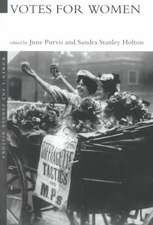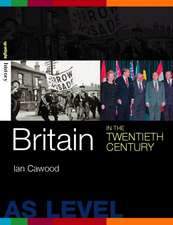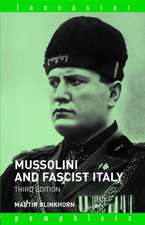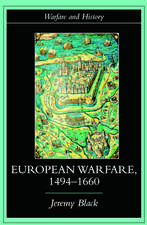German Colonialism, Visual Culture, and Modern Memory: Routledge Studies in Modern European History
Editat de Volker Langbehnen Limba Engleză Hardback – 3 feb 2010
This collection of new essays illustrates the dramatic changes and vast array of perspectives that have recently emerged in the study of German colonialism. In documenting the latest cutting-edge research of German colonial history, the contributors to this volume prove wrong the persistent assumptions that the creation of Germany’s colonial empire did not have any lasting impact on German political and cultural life. Their essays document how colonialism in its various forms was entwined with the inner workings of modern German life and society, especially through the cultural and technical innovations of its time. In contrast to existing research, these studies show that colonial Germany played a significant role in shaping German perceptions of racial difference, influenced German support for World War I, and facilitated the construction of German nationalism. German Colonialism, Visual Culture, and Modern Memory uniquely demonstrates that the visual culture of colonialism is closely linked to the fascination with new modes of seeing and the enigma of visual experience that have become trademarks of modernity.
| Toate formatele și edițiile | Preț | Express |
|---|---|---|
| Paperback (1) | 442.82 lei 6-8 săpt. | |
| Taylor & Francis – 27 iul 2012 | 442.82 lei 6-8 săpt. | |
| Hardback (1) | 1120.20 lei 6-8 săpt. | |
| Taylor & Francis – 3 feb 2010 | 1120.20 lei 6-8 săpt. |
Din seria Routledge Studies in Modern European History
- 9%
 Preț: 1006.46 lei
Preț: 1006.46 lei -
 Preț: 288.80 lei
Preț: 288.80 lei - 9%
 Preț: 935.39 lei
Preț: 935.39 lei -
 Preț: 341.55 lei
Preț: 341.55 lei -
 Preț: 311.41 lei
Preț: 311.41 lei -
 Preț: 342.58 lei
Preț: 342.58 lei - 9%
 Preț: 934.94 lei
Preț: 934.94 lei -
 Preț: 311.47 lei
Preț: 311.47 lei - 18%
 Preț: 1057.09 lei
Preț: 1057.09 lei - 18%
 Preț: 1124.39 lei
Preț: 1124.39 lei - 26%
 Preț: 846.50 lei
Preț: 846.50 lei -
 Preț: 369.73 lei
Preț: 369.73 lei - 18%
 Preț: 1056.28 lei
Preț: 1056.28 lei - 18%
 Preț: 1062.98 lei
Preț: 1062.98 lei - 26%
 Preț: 820.92 lei
Preț: 820.92 lei - 15%
 Preț: 461.03 lei
Preț: 461.03 lei -
 Preț: 430.37 lei
Preț: 430.37 lei - 18%
 Preț: 942.65 lei
Preț: 942.65 lei -
 Preț: 452.15 lei
Preț: 452.15 lei - 18%
 Preț: 1113.12 lei
Preț: 1113.12 lei - 26%
 Preț: 765.19 lei
Preț: 765.19 lei - 26%
 Preț: 766.27 lei
Preț: 766.27 lei - 18%
 Preț: 1113.12 lei
Preț: 1113.12 lei - 26%
 Preț: 764.20 lei
Preț: 764.20 lei - 18%
 Preț: 1188.89 lei
Preț: 1188.89 lei - 18%
 Preț: 910.22 lei
Preț: 910.22 lei - 18%
 Preț: 1108.37 lei
Preț: 1108.37 lei - 18%
 Preț: 1004.20 lei
Preț: 1004.20 lei - 18%
 Preț: 1055.51 lei
Preț: 1055.51 lei - 25%
 Preț: 824.80 lei
Preț: 824.80 lei -
 Preț: 485.40 lei
Preț: 485.40 lei - 26%
 Preț: 821.53 lei
Preț: 821.53 lei - 25%
 Preț: 796.11 lei
Preț: 796.11 lei - 18%
 Preț: 2230.89 lei
Preț: 2230.89 lei - 26%
 Preț: 822.36 lei
Preț: 822.36 lei - 18%
 Preț: 1057.75 lei
Preț: 1057.75 lei - 26%
 Preț: 736.38 lei
Preț: 736.38 lei - 18%
 Preț: 1066.09 lei
Preț: 1066.09 lei - 26%
 Preț: 764.20 lei
Preț: 764.20 lei - 18%
 Preț: 1058.65 lei
Preț: 1058.65 lei -
 Preț: 275.87 lei
Preț: 275.87 lei -
 Preț: 438.05 lei
Preț: 438.05 lei -
 Preț: 446.32 lei
Preț: 446.32 lei - 18%
 Preț: 703.93 lei
Preț: 703.93 lei - 18%
 Preț: 1116.27 lei
Preț: 1116.27 lei
Preț: 1120.20 lei
Preț vechi: 1366.10 lei
-18% Nou
Puncte Express: 1680
Preț estimativ în valută:
214.40€ • 220.95$ • 181.01£
214.40€ • 220.95$ • 181.01£
Carte tipărită la comandă
Livrare economică 03-17 martie
Preluare comenzi: 021 569.72.76
Specificații
ISBN-13: 9780415997799
ISBN-10: 0415997798
Pagini: 328
Ilustrații: 54 b/w images, 48 halftones and 6 line drawings
Dimensiuni: 152 x 229 x 23 mm
Greutate: 0.77 kg
Ediția:1
Editura: Taylor & Francis
Colecția Routledge
Seria Routledge Studies in Modern European History
Locul publicării:Oxford, United Kingdom
ISBN-10: 0415997798
Pagini: 328
Ilustrații: 54 b/w images, 48 halftones and 6 line drawings
Dimensiuni: 152 x 229 x 23 mm
Greutate: 0.77 kg
Ediția:1
Editura: Taylor & Francis
Colecția Routledge
Seria Routledge Studies in Modern European History
Locul publicării:Oxford, United Kingdom
Public țintă
Postgraduate and UndergraduateCuprins
Acknowledgements. Introduction: Picturing Race: Visuality and German Colonialism. Volker Langbehn. German Colonialism 1884–1919. 1. Advertising and the Optics of Colonial Power at the fin de siècle. David Ciarlo. 2. "... will try to send you the best views from here" – Postcards from the Colonial War in Namibia (1904–1908). Felix Axster. 3. Harmless "Kolonialbiedermeier"? Colonial and Exotic Trading Cards. Joachim Zeller. 4. Cakewalking the Anarchy of Empire around 1900. Astrid Kusser. 5. Satire Magazines and Racial Politics. Volker Langbehn. 6. Demystifying Colonial Settlement: Building Handbooks for Settlers, 1904–1930. Itohan Osayimwese. 7. Patriotism, Spectacle and Reverie: Colonialism in Early Cinema. Wolfgang Fuhrmann. German Postcolonialism 1919–Present. 8. Persuasive Maps and a Suggestive Novel – Hans Grimm’s Volk ohne Raum and German Cartography in Southwest Africa. Oliver Simons. 9. Colonial Disgust: The Colonial Master’s Emotion of Superiority. Thomas Schwarz. 10. Weimar Revisions of Germany’s Colonial Past: The Photomontages of Hannah Höch and László Moholy-Nagy. Brett M. Van Hoesen. 11. The "Colonial Idea" in Weimar Cinema. Christian Rogowski. 12. "The Black Jew": An After-Image of German Colonialism. Birgit Haehnel. 13. Reenacting Colonialism: Germany and its Former Colonies in Recent TV Productions. Wolfgang Struck. 14. Postcolonial Amnesia? Taboo Memories and Kanaks with Cameras. Deniz Göktürk. Contributors. References. Index.
Notă biografică
Volker Langbehn (Ph.D. University of Minnesota, Minneapolis, 1998) is Associate Professor of German at San Francisco State University, California. He is the author of Arno Schmidt's Zettels Traum: An Analysis (2003) and has published articles on Friedrich Nietzsche, Christa Wolf, Arno Schmidt, Fritz von Unruh, Novalis and Gert Heidenreich, and the visual representation of German Colonialism. He is the co-editor with Dr. Mohammad Salama of Colonial (Dis)-Continuities: Race, Holocaust, and Postwar Germany (2010). His current book project tentatively titled The Visual Representation of Cultural Identity in German Mass Culture Around 1900 focuses on visual representations of Africa in German mass culture. It is a study of how racism can develop in a modern society through subtle, everyday means, and it explores the negative consequences of race thinking upon the long-term development of German identity. He examines how images of Africa and Africans contained in four types of media – political caricatures in satirical magazines, picture postcards, black-and-white photographs, and illustrated children’s literature – helped foster a racialized German national identity.
Recenzii
‘[A] comprehensive collection of studies that examine materials from new and creative angles. The inclusion of essays on both issues of actual German colonialism, as well as its continuation in different shapes in postcolonial times, convincingly demonstrates that continuous engagement with its ideological legacy is still of relevance today. … What distinguishes most contributions is the interdisciplinary methods of inquiry their authors use to provide new insights into German colonialism and its impact.’
– German Studies Review
– German Studies Review
Descriere
Investigating visual communication and mass culture, print culture and suggestive racial politics, racial aesthetics, racial politics and early German film, racial continuity and German film, and photography, German Colonialism, Visual Culture, and Modern Memory offers compelling evidence of a German society between 1884 and 1919 that produced vibrant and heterogeneous—and at times contradictory—cultures of colonialism.











